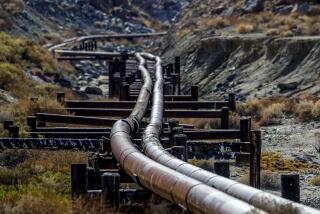Gas Pipeline Competitors Put Their Futures on the Line : Supply and demand: Analysts predict there will be only one winner--or no winner--between two companies that want to build a pipeline to ship natural gas from Canada to California.
- Share via
CALGARY, Canada — Rivals to build a natural gas pipeline from Canada to California are continuing to raise the ante in a costly poker game that neither may win.
On one side of the table is Pacific Gas & Electric Co. subsidiary Pacific Gas Transmission, which has laid down $172 million in the past two years in a bid to expand its pipeline system to California.
On the other is Altamont Gas Transmission Co., whose primary partners are Houston-based Tenneco Inc. and the Canadian arm of Amoco Corp. So far, Altamont’s stake in a proposed new California pipeline is about $15.5 million.
In the latest round of betting, the companies upped the ante by more than $26 million, which they each gave to an Alberta pipeline company in letters of credit to ensure construction of Canadian export facilities.
It’s a high-stakes game, and one in which analysts say there can be only one winner, or no winners at all.
Although California is Canada’s largest gas export market, demand for gas is not expected to grow enough to need supplies from two new pipelines.
In fact, there is doubt that demand will be sufficient to take all of the gas from even one pipeline by proposed start-up dates in 1993.
“Many people are wondering if we need one pipeline and if it will be full,” said Peter Linder, director of natural gas for the Canadian Energy Research Institute.
“The way things are going, both pipelines could proceed, but the oversupply would have a disastrous effect on gas prices, and tariffs for shippers would be much higher for a half-full pipeline,” he said.
More than two years ago, Washington’s Energy Regulatory Commission said the market should decide which project goes ahead. However, since then, industry has been unable to pick the pipeline it wants.
Both projects claim they have enough shippers on contract to fill their respective pipelines, each of which would transport more than 700 million cubic feet of gas a day to Northern California. The projects also have the necessary U.S. government approvals to proceed.
“What has to happen is one of these companies has to go out and start digging the trench in which they are going to put the pipe,” said a spokesman for a Canadian gas producer who did not want to be identified.
The spokesman said his company has reserved pipeline space on both projects to ensure a future foothold in the California market.
Like most producers, he is surprised that Altamont and Pacific Gas have been able to continue the contest for as long as they have, in the face of vocal industry and government calls for only one pipeline.
“This thing has gone past the wire and into the ridiculous,” he said.
The next round of betting will be even more expensive.
Nova Corp. of Alberta, the company that must build the Canadian pipeline facilities to the U.S. border, wants additional irrevocable letters of credit worth $163 million from both project sponsors by May 1, 1992.
“Other pipeline requirements have not been this stringent,” Linder said. “I think Nova is going to force a decision by this spring.”
“Nova does not expect both projects to proceed within the Nov. 1, 1993, time frame,” said Bruce Simpson, president of Nova’s Alberta Gas Transmission Division. “Nova must therefore alleviate the risk of incurring costs which may not be recoverable.”
Altamont and Pacific Gas gave Nova initial letters of credit last week, each worth more than $26 million.
“It looks like both companies are going to take this right to the end,” Altamont spokesman Chris Horner said.
More to Read
Inside the business of entertainment
The Wide Shot brings you news, analysis and insights on everything from streaming wars to production — and what it all means for the future.
You may occasionally receive promotional content from the Los Angeles Times.










